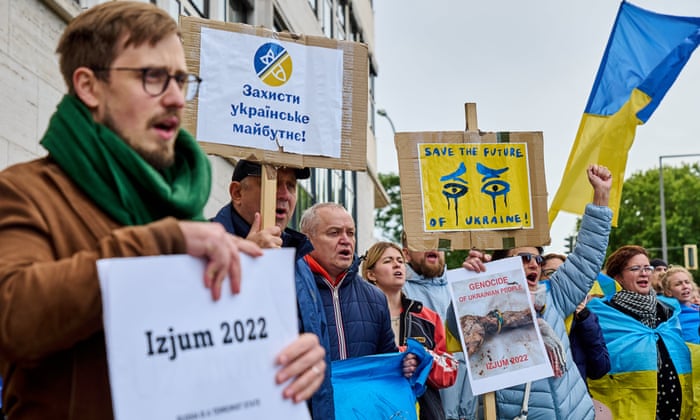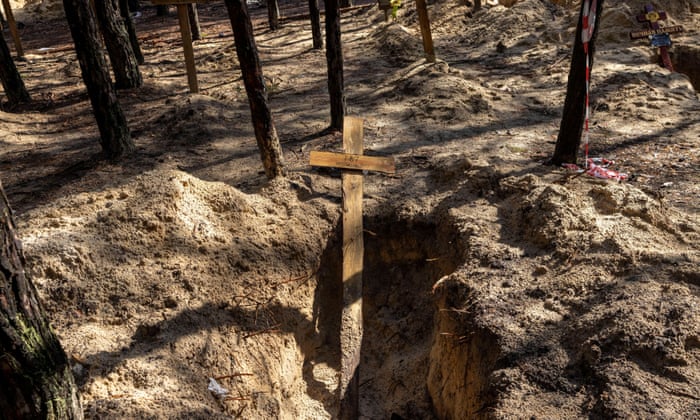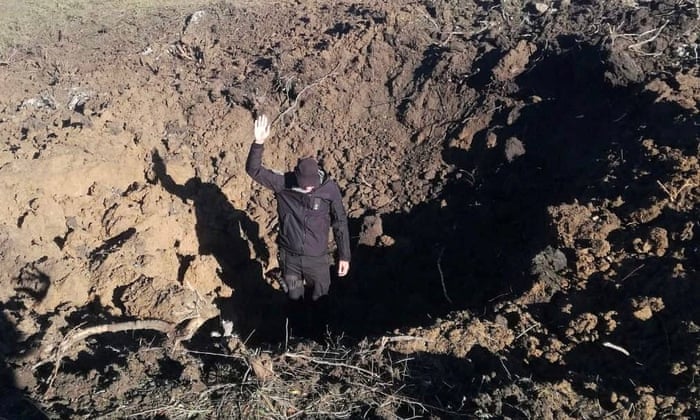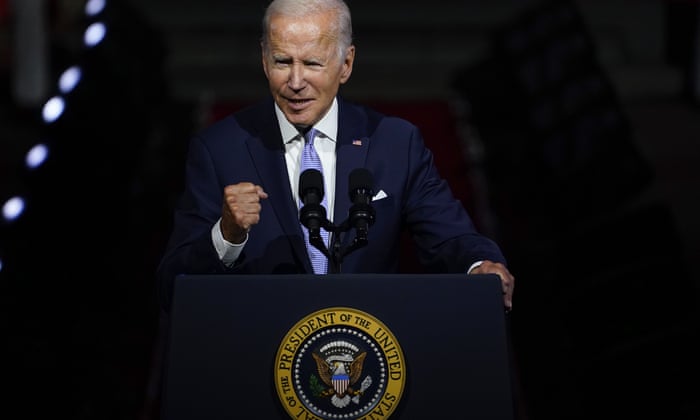Pivdennoukrainsk nuclear power plant struck
Reuters has more information on the Russian strike on the Pivdennoukrainsk nuclear power plant in the early hours of Monday:
Russian troops struck the Pivdennoukrainsk nuclear power plant in Ukraine’s southern Mykolaiv region early on Monday but its reactors have not been damaged and are working normally, Ukraine’s state nuclear company Energoatom said.
A blast took place 300 metres away from the reactors and damaged power plant buildings shortly after midnight, Energoatom said in a statement. The attack has also damaged a nearby hydroelectric power plant and transmission lines.
Energoatom said:
Currently, all three power units of the PNPP (Pivdennoukrainsk Nuclear Power Plant) are operating normally. Fortunately, there were no casualties among the station staff
It published two photographs showing a crater it said was caused by the blast. In one of the pictures a man stood in the crater to give a sense of its size.
Commenting on the strike on the Telegram messaging app, Ukraine‘s President Volodymyr Zelenskiy said:
The invaders wanted to shoot again, but they forgot what a nuclear power plant is. Russia endangers the whole world. We have to stop it before it’s too late.
There was no immediate Russian reaction to Ukraine’s accusations.
The Mykolaiv region has been under constant rocket attack by Russian forces in recent weeks.
Another Ukrainian nuclear power plant at Zaporizhzhia – which is Europe’s largest and lies about 250km (155 miles) east of the Mykolaiv site – was shut down earlier this month due to Russian shelling, prompting concerns about a possible nuclear disaster.
Russia and Ukraine have blamed each other for shelling at the Zaporizhzhia plant, which is held by Russian forces but operated by Ukrainian staff. The shelling has damaged buildings and disrupted power lines.
The UN nuclear watchdog said this weekend one of the four main power lines at the Russian-held Zaporizhzhia nuclear facility had been repaired and was once again supplying the plant with electricity from the Ukrainian grid.
Key events
The Associated Press has a preview of this week’s meeting of the UN general assembly:
Facing a complex set of challenges that try humanity as never before, world leaders convene at the United Nations this week under the shadow of Europe’s first major war since World War II — a conflict that has unleashed a global food crisis and divided major powers in a way not seen since the Cold War.
The many facets of the Ukraine war are expected to dominate the annual meeting, which convenes as many countries and peoples confront growing inequality, an escalating climate crisis, the threat of multiple famines and an internet-fuelled tide of misinformation and hate speech — all atop a coronavirus pandemic that is halfway through its third year.
For the first time since the United Nations was founded atop the ashes of World War II, European nations are witnessing war in their midst waged by nuclear-armed neighbouring Russia.
Its invasion not only threatens Ukraine‘s survival as an independent democratic nation but has leaders in many countries worrying about trying to preserve regional and international peace and prevent a wider war.
The UN secretary-general, António Guterres, said the strategic divides — with the west on one side and Russia and increasingly China on the other — are “paralysing the global response to the dramatic challenges we face”.
He pointed not only to the devastation in Ukraine from nearly seven months of fighting but to the war’s impact on the global economy.
Escalating food and energy prices are hitting the world’s poorest people hardest, and nations are “being devoured by the acids of nationalism and self-interest” instead of working together and resolving disputes peacefully, two principles that lie at the heart of the UN charter and underpin everything the United Nations tries to do.

German chancellor Olaf Scholz will visit Saudi Arabia and meet Saudi Crown Prince Mohammed bin Salman as part of a Gulf trip, his spokesman said on Monday, as Germany rushes to secure energy supplies.
Scholz, whose two-day trip will also take him to Qatar and the United Arab Emirates, will become the latest Western leader to meet with the crown prince.
Bin Salman has been regarded as a pariah in the West due to his suspected role in the murder of Washington Post journalist Jamal Khashoggi in 2018.
But he is being courted again as Europe and its allies urgently seek fresh sources of fossil fuels after Russia cut gas supplies amid soaring tensions over its invasion of Ukraine.
Agence France-Press reports:
Scholz, accompanied by a business delegation, will visit Saudi Arabia on Saturday, where he will meet with the crown prince and – if his health permits it – King Salman, government spokesman Steffen Hebestreit said.
He did not go into detail about the reasons for Scholz’s Gulf visit but said he would be “very surprised” if the topic of energy was not discussed.
The spokesman also offered assurances that “the murder of Mr Khashoggi will certainly figure in discussions”.
It is the latest sign of bin Salman’s international rehabilitation – in July, French President Emmanuel Macron held talks with him in Paris, and US President Joe Biden visited the kingdom.
On Sunday, Scholz will head to the UAE and meet with President Sheikh Mohamed bin Zayed Al-Nahyan, and in the afternoon will hold talks with Qatari Emir Sheikh Tamim bin Hamad Al-Thani.
German economy minister Robert Habeck already visited Qatar and the UAE in March in an effort to find alternatives to Russian gas, which Germany has traditionally depended on heavily.
Russia’s decision to cut off supplies has triggered an energy crisis in Europe, with consumers and businesses facing soaring bills as winter approaches.
Russian-backed separatists in eastern Ukraine have sentenced an employee of the Organization for Security and Cooperation in Europe (OSCE) – the world’s largest regional security organisation – to 13 years in jail on treason charges, Russian news agencies reported Monday.
“A panel of judges found Dmitry Pavlovich Shabanov guilty … and sentenced him to 13 years in prison,” the RIA Novosti news agency reported, quoting the supreme court of the self-proclaimed Lugansk People’s Republic (LNR).
Shabanov, who was detained in April, is accused of passing confidential information to foreign intelligence services, Agence France-Presse reports.
According to separatist authorities, Shabanov was recruited in 2016 by a former officer of Ukraine’s SBU security service and an agent in Ukraine of the US Central Intelligence Agency.
Between August 2021 and April 2022, he collected “information on the movements of military equipment as well as units of the Lugansk People’s Army” and “sent them to the CIA agent”, the separatists said.
The OSCE has “unequivocally” condemned the charges against Shabanov and Mikhail Petrov, another OSCE staffer detailed in April, describing the allegations as “totally unacceptable so-called ‘legal proceedings’”.
The OSCE mission, which has been deployed in the conflict zone since 2014, left the separatist regions of Donetsk and Lugansk in the wake of Russia’s offensive in Ukraine earlier this year.

Here is what we know so far regarding the more than 440 graves that have been uncovered in a forest near Izium in eastern Ukraine.
According to Agence France-Presse (AFP), some of the bodies recovered had their hands tied. Others showed signs of having suffered violence.
Last week, Ukraine’s president, Volodymyr Zelenskiy, announced the discovery of a mass grave in Izyum after it was recaptured from the Russians.
At one burial site, more than 440 graves dating between March and September 2022 were discovered.
Investigators have exhumed the bodies of at least 17 Ukrainian soldiers from one site. A cross over the grave bore the inscription: “Ukrainian army, 17 people. Izium morgue.”
The authorities say there are more than 440 tombs because the last number entered on the crosses is 445. Some of the crosses are made from varnished wood and also carry names and dates.
Investigators say about 100 bodies have been exhumed.
Ukrainian officials suspect that some of the dead were tortured by Russian forces during their occupation of the north-east Kharkiv region.
At least two of the bodies recovered were found with their hands tied, AFP journalists said. One of the two “had their hands tied, their jaw broken and two stab wounds in the back”, a member of the Kharkiv prosecutor’s office told AFP on condition of anonymity.
The remains have been identified as that of a pro-Ukrainian volunteer fighter, the official added.
Civilians who died during fighting in March for control of the city have also been exhumed.
Around 10 teams – each of around four people, including representatives of the prosecutor’s office – have been at work investigating following the discovery of the graves.
Emergency service workers in white overalls were handling the exhumations.
Kharkiv prosecutor Yevgen Sokolov, who is leading the investigation, said he did not have an exact number for those thought to have suffered violent deaths. Of the bodies so far exhumed, he said “most have wounds from shelling and explosions”.
Others had suffered “injuries from sharp objects and showed signs of violent death”, he said. Sokolov said one combatant had had “his hands tied behind his back” and another was found with “rope around the neck and broken limbs”. He also said a body was exhumed “with multiple stab wounds”.
“At this point, we don’t have bodies with bullets in their skulls but there is still a lot of work to be done,” he said.
If the weather remained mild, he estimated it would take another week to finish exhuming the bodies.
Europe’s imports of thermal coal in 2022 could be the highest in at least four years and may rise further next year, analysts said on Monday, highlighting the extent of the energy crisis following sanctions on Russia, Reuters reports.
European imports of thermal coal this year could rise to about 100m tonnes, the most since 2017, according to Noble Resources International Pte Ltd, while commodities pricing agency Argus expects shipments to reach a four-year high.
“Europe is going back in time,” Rodrigo Echeverri, head of research at Noble, told a conference.
European governments have outlined new measures on how they will cope with potential energy shortages this winter, with Russian gas flows still running at severely reduced rates amid the Ukraine war.
Reuters reports that Spain has drawn up plans that could force energy-intensive industries to shut at peak demand times.
France said it was preparing to send gas to Germany from October, while Berlin said Europe’s powerhouse was still in talks on state aid for ailing utility Uniper.
Russia, which had supplied about 40% of the European Union’s gas before its February invasion of Ukraine, has said it closed the Nord Stream 1 pipeline – once one of Europe’s major gas supply routes – because western sanctions hindered operations.
European gas prices have more than doubled from the start of the year amid a decline in Russian supplies.
The sharp drop in Russian fuel exports has left governments scrambling to find energy resources, but also to warn that power cuts could happen, amid fears of recession.
In France, exports of natural gas to Germany could start around 10 October, the head of France’s CRE energy regulator said, following an announcement by president Emmanuel Macron that the two EU neighbours would help each other with electricity and gas flows amid the crisis.
CRE chief Emmanuelle Wargon told FranceInfo radio:
Gas was (until now) only flowing from Germany to France, so we did not have the technical tools to reverse the flows and we did not even have a method to regulate prices.”
Wargon added that “exceptional” measures this winter could include localised electricity cuts if the winter is cold and EDF’s plans to repair corrosion-hit nuclear reactors are delayed.
“But there will be no gas cuts for households. Never,” she said.
Spanish industry minister Reyes Maroto said that obliging energy-intensive companies to close down during consumption peaks is an option on the table this winter if required.
The companies would be compensated financially, she said adding there is no need to impose such closures now.
And Finns were warned they should be prepared for power outages.
National grid operator Fingrid said:
As a result of great uncertainties, Finns should be prepared for power outages caused by a possible power shortage in the coming winter.”
Finnish power retailer Karhu Voima Oy said it had filed for bankruptcy due to a sharp rise in electricity price rises.

German finance minister Christian Lindner said on Monday that he was still looking at ways to ensure gas prices remained affordable for people while awaiting recommendations from a group of experts.
When asked about a possible cap on gas prices Lindner said:
We have developed this commission, but proposals within the federal government are also being considered further, so it has not been completely outsourced.”
German economy likely to shrink for ‘prolonged’ period, Bundesbank warns
The German central bank said on Monday it was increasingly likely that Europe’s largest economy would shrink for a “prolonged” period as Russia throttled energy supplies to the continent.
In its monthly report, the Bundesbank said:
The signs of a recession for the German economy are multiplying.”
It also warned of a “broad-based and prolonged decline in economic output”.
The likely slump was above all down to “supply-side constraints”, namely reduced deliveries of energy in the wake of the Russian invasion of Ukraine, Agence France-Presse reports.
Moscow has drastically reduced it supplies of gas to Europe and kept the Nord Stream pipeline shut since the end of August, heaping pressure on Germany’s economy.
Germany had been highly reliant on Russian energy imports with 55% of its gas coming from Russia before the outbreak of the war.
The economy would likely shrink “slightly” in the third quarter of the year, the Bundesbank said, before a “marked” drop over the last three months of 2022 and the beginning of 2023.
The Russian gas supply stop meant that the situation regarding gas markets was “very tense”, it said.
Germany could “avoid formal rationing” of the fuel, but necessary reductions in consumption would lead companies to limit or pause production, the central bank predicted.
Thirteen people were killed in artillery shelling on Monday in the east Ukrainian separatist-held city of Donetsk, the city’s Russian-backed mayor said.
Reuters reports that in a statement posted on the Telegram messenger app, Donetsk’s separatist mayor Alexei Kulemzin said that 13 civilians including two children had been killed in the strike on Donetsk’s Kuybyshevsky district.
He said that the number of wounded was being confirmed.
Donetsk city has been controlled by the Russian-backed Donetsk People’s Republic since 2014.
The Ukrainian army continues to hold positions on Donetsk’s outskirts, and the city has come under artillery fire repeatedly in recent months.
The Guardian is unable to verify battlefield reports.

The Kremlin has rejected allegations that Russian forces had committed war crimes in Ukraine’s Kharkiv province as a “lie”.
About 450 bodies, most of which Ukraine says are those of civilians, have been found in mass graves near Izium after Russian troops were this month forced out of the Kharkiv region, much of which they had controlled since the first weeks of their military campaign in Ukraine.
Ukraine’s president, Volodymyr Zelenskiy, said investigators at the site had found evidence of torture, including bodies with hands tied, and accused Russian troops of committing war crimes.
Asked on Monday about Zelenskiy’s statements, Kremlin spokesperson Dmitry Peskov told reporters: “It’s the same scenario as in Bucha. It’s a lie, and of course we will defend the truth in this story.”
Russia previously rejected claims that its troops had committed war crimes in Bucha, outside Kyiv, after evidence of civilians being killed while the town was controlled by Russian troops came to light after Russia’s withdrawal at the end of March. (Via Reuters)
Last week, Zelenskiy accused Russia of “leaving death everywhere” after the discovery of the Izium site. Men in white overalls began digging out bodies last Friday as part of a mass exhumation at the site, reporters with the Reuters news agency said, and 20 white bodybags could be seen. Reuters reported that several bodies had rope tied around their necks and hands.

Ukraine’s atomic energy operator, Energoatom, has described the Russian missile strike on the Pivdennoukrainsk nuclear power plant – see earlier post here – as an act of “nuclear terrorism”. (Via AP)

Daniel Boffey

Russia is urging Uefa to ban the manager of the Ukraine men’s national team after he expressed a wish to fight Vladimir Putin’s invading forces, the Guardian can reveal.
The Football Union of Russia has written to the governing body accusing Oleksandr Petrakov of discriminating against Russians and failing to remain politically neutral.
Denis Rogachev, the deputy secretary general of the FUR, cited comments carried in two newspapers – Italy’s Corriere dello Sport and Russia’s Sport Express – as evidence of Petrakov’s guilt.
In a letter to Uefa’s control, ethics and disciplinary body, Petrakov is accused of breaching codes of conduct by calling for Russians to be banned from international sport and talking about his hopes of joining the armed forces.
Full story here.

The US president, Joe Biden, used an interview with CBS’s 60 Minutes programme on Sunday night to warn Vladimir Putin that the use of nuclear or other non-conventional weapons against Ukraine would prompt a “consequential” response from the US.
When asked what he would tell Putin if the Russian leader was mulling such a move, he said: “Don’t. Don’t. Don’t.”
Biden praised the Ukrainians for their gritty fight against the Russian invasion and said: “They’re defeating Russia”.
Asked how to define victory for Kyiv, he said: “Winning the war in Ukraine is to get Russia out of Ukraine completely.”
But given the scale of human suffering and destruction inflicted in resisting the Russian onslaught, “it’s awful hard to count that as winning”, he added.
Pivdennoukrainsk nuclear power plant struck
Reuters has more information on the Russian strike on the Pivdennoukrainsk nuclear power plant in the early hours of Monday:
Russian troops struck the Pivdennoukrainsk nuclear power plant in Ukraine’s southern Mykolaiv region early on Monday but its reactors have not been damaged and are working normally, Ukraine’s state nuclear company Energoatom said.
A blast took place 300 metres away from the reactors and damaged power plant buildings shortly after midnight, Energoatom said in a statement. The attack has also damaged a nearby hydroelectric power plant and transmission lines.
Energoatom said:
Currently, all three power units of the PNPP (Pivdennoukrainsk Nuclear Power Plant) are operating normally. Fortunately, there were no casualties among the station staff
It published two photographs showing a crater it said was caused by the blast. In one of the pictures a man stood in the crater to give a sense of its size.
Commenting on the strike on the Telegram messaging app, Ukraine‘s President Volodymyr Zelenskiy said:
The invaders wanted to shoot again, but they forgot what a nuclear power plant is. Russia endangers the whole world. We have to stop it before it’s too late.
There was no immediate Russian reaction to Ukraine’s accusations.
The Mykolaiv region has been under constant rocket attack by Russian forces in recent weeks.
Another Ukrainian nuclear power plant at Zaporizhzhia – which is Europe’s largest and lies about 250km (155 miles) east of the Mykolaiv site – was shut down earlier this month due to Russian shelling, prompting concerns about a possible nuclear disaster.
Russia and Ukraine have blamed each other for shelling at the Zaporizhzhia plant, which is held by Russian forces but operated by Ukrainian staff. The shelling has damaged buildings and disrupted power lines.
The UN nuclear watchdog said this weekend one of the four main power lines at the Russian-held Zaporizhzhia nuclear facility had been repaired and was once again supplying the plant with electricity from the Ukrainian grid.
Russian troops have struck the Pivdennoukrainsk nuclear power plant in the southern Mykolaiv region, but its reactors have not been damaged and are working normally, Reuters reports.
According to Ukraine’s state nuclear company, Energoatom, a blast early on Monday took place 300 metres from the reactors and damaged power plant buildings. The attack has also damaged a nearby hydroelectric power plant and transmission lines.




















Discussion about this post